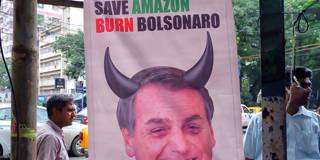The crisis in the Amazon is a stark example of the damage that can be done when governments bow unequivocally to business. But it also highlights a related, damaging, and increasingly common phenomenon: the cynical manipulation of anti-corruption efforts to undermine democracy and advance an authoritarian political agenda.
ITHACA – The Amazon rainforest has been burning for weeks. Yet Brazil’s right-wing president, Jair Bolsonaro, mobilized the armed forces to help contain the fires only in the last few days – in the face of European leaders’ threat to suspend a major trade deal and the possibility of a far-reaching boycott of Brazilian products. And though the Bolsonaro government’s rollback and weak enforcement of laws protecting the Amazon are root causes of the crisis, encouraging ranchers to set fires to clear land for agriculture, there has been no mention of any policy change.
The crisis in the Amazon is a stark example of the damage that can be done when governments bow unequivocally to business interests. It also highlights an increasingly common phenomenon: the cynical manipulation of anti-corruption efforts to undermine democracy and advance an authoritarian political agenda.
Some conservative economists argue that corruption can be benign, or even beneficial, as it enables economic actors to bypass regulations, thereby enabling markets to function more effectively. While there may be instances of benign corruption, the truth is that corruption corrodes markets, protects incumbents from competitive challenges by impeding the entry of new actors, destroys the moral fabric of society, and stunts economic development. Indeed, as Transparency International’s Corruption Perceptions Index (CPI) shows, there is a strong inverse correlation between development and corruption.

ITHACA – The Amazon rainforest has been burning for weeks. Yet Brazil’s right-wing president, Jair Bolsonaro, mobilized the armed forces to help contain the fires only in the last few days – in the face of European leaders’ threat to suspend a major trade deal and the possibility of a far-reaching boycott of Brazilian products. And though the Bolsonaro government’s rollback and weak enforcement of laws protecting the Amazon are root causes of the crisis, encouraging ranchers to set fires to clear land for agriculture, there has been no mention of any policy change.
The crisis in the Amazon is a stark example of the damage that can be done when governments bow unequivocally to business interests. It also highlights an increasingly common phenomenon: the cynical manipulation of anti-corruption efforts to undermine democracy and advance an authoritarian political agenda.
Some conservative economists argue that corruption can be benign, or even beneficial, as it enables economic actors to bypass regulations, thereby enabling markets to function more effectively. While there may be instances of benign corruption, the truth is that corruption corrodes markets, protects incumbents from competitive challenges by impeding the entry of new actors, destroys the moral fabric of society, and stunts economic development. Indeed, as Transparency International’s Corruption Perceptions Index (CPI) shows, there is a strong inverse correlation between development and corruption.